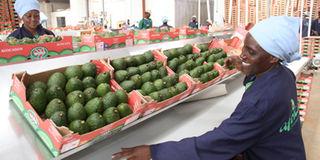Farmers to benefit from Sh2bn plan

Tanzania has great horticulture potential and the new programme is expected to unlock opportunities. PHOTO|FILE
What you need to know:
- The cost of the project is euro 1,058,000, according to the communications officer with the Tanzania Horticultural Association ( Taha), Ms Adda Ngoya
- “The agreement is aimed at building capacity to the farmers through their organisations. It will work closely with the farmer groups and monitor service delivery to their members” said Ms Ayesiga Buberwa, a programme manager with the Tanzania Horticultural Association (Taha), one of the four organisations in the partnership.
Arusha. A five-year project aimed to support farmers’ groups in Arusha and Manyara regions to enable them to improve agricultural productivity was launched here last week with the partner organisations involved optimistic on its success.
The cost of the project is euro 1,058,000, according to the communications officer with the Tanzania Horticultural Association ( Taha), Ms Adda Ngoya
“The agreement is aimed at building capacity to the farmers through their organisations. It will work closely with the farmer groups and monitor service delivery to their members” said Ms Ayesiga Buberwa, a programme manager with the Tanzania Horticultural Association (Taha), one of the four organisations in the partnership.
She told BusinessWeek: “We will be giving support to farmer organisations, dealing with farmers in various ways and giving them funds to operate in various ways” are going to support deal with the farmers in various ways”.
The official launch of Cooperation Agreement attracted four organisations which will support implementation of the project titled ‘Strengthening Farmers’ Organisations for Sustainable Agricultural Development’. Besides Taha, others are Trias Tanzania, Andreas Hermes Akademie (Aha), a German institution.
Aha is a German farmer-based agri-agency and capacity-building institution. The programme also involves another German entity known only as DBV as well as the National Network for Farmers (Mviwata) in Arusha and Manyara regions.
“A well organised agriculture sector is key to a sustainable agricultural development. For farmers to perform well in a complex environment, they need strong, politically and economically independent organisations”, these were the key remarks made by the representatives of the institutions as they signed the agreement in the leafy suburb of Arusha.
Taha CEO Jacqueline Mkindi signed on behalf of her organization while Richard Masandika and Martin Pius, the Mviwata coordinators for Arusha and Manyara penned on behalf of the two organisations respectively. Trias was represented by the country director Bart Casier.
According to Ms Buberwa,the programme will reach up to 35,000 individual farmers in the two regions but through their respective organisations which range from farmers’ groups at grassroots level to the cooperatives, unions, federations and commodity based like Taha.
They may also be serving different types of producers of one region, like Mviwata Arusha and Mviwata Manyara “which are both representing and supporting small-scale farmers in their region, including a great variety of value-chains”.
Under the programme, whose cost the Taha official could not disclose, Aha, which is rooted in the farming sector in Germany will support the farmers’ bodies in leadership and management, in improving their capacities in lobbying and advocacy and training and entrepreneurship.
This will result in strengthening capacities of individuals and the partner organisations as a whole to become successful agricultural entrepreneurs and build a sustainable and vibrant agricultural sector.
Trias, a Belgian organisation which has been in Tanzania for more than 25 years, will cooperate with Aha to strengthen the capacity of six member-based organizations of the farmers’ groups as well as small scale entrepreneurs based in urban and peri-urban areas.
Aha is funded by the German government is and currently working in five African countries, including Tanzania while Trias supports more than one million farmers and small entrepreneurs in 14 countries across Africa, Asia and Latin America.
Among the institutions supported by Aha is the East African Farmers Federation (EAFF). Under the programme, Trias will supportr three types of member-based organisations; the first category being Mviwata in Arusha and Manyara, Taha. There will also be entrepreneur organizations and pastoralist organisations. The project targets to have at least 2,000 people assisted to access microfinance credit services, 9,000 trained in entrepreneurship, supporting 11,650 Mviwata members to ensure they adopted production techniques in six selected value chains with economic potential.
At least 4,850 members of the farmers’ groups are to be supported to adopt sustainable agricultural practices while 40,000 hectares of wildlife corridors, pastoralist land and water sources protected in the intervention zone, especially in the Lake Manyara-Lake Natron wildlife corridor.
Mviwata Arusha’s role in the programme will, among other areas, focus on youth entrepreneurship, value chain development for onions, honey and poultry and improving service delivery in agronomic extension services, veterinary services, access to quality inputs, post-harvest handling, access to financial services and market information and market linkages.
In Manyara, the emphasis will be on value chain development for garlic and honey while on environment, the mini-projects earmarked for implementation are those on bee-keeping, water management, tree-nurseries and tree-planting, bio-gas and climate change adaptation.
Mviwata Manyara started its operations in September 2006.It has 50 local networks in Babati Urban, Babati Rural, Kiteto, Mbulu, Simanjiro and Hanang districts with a total of 7,522 members _ 50 per cent of them being women and 18 per cent youth.




